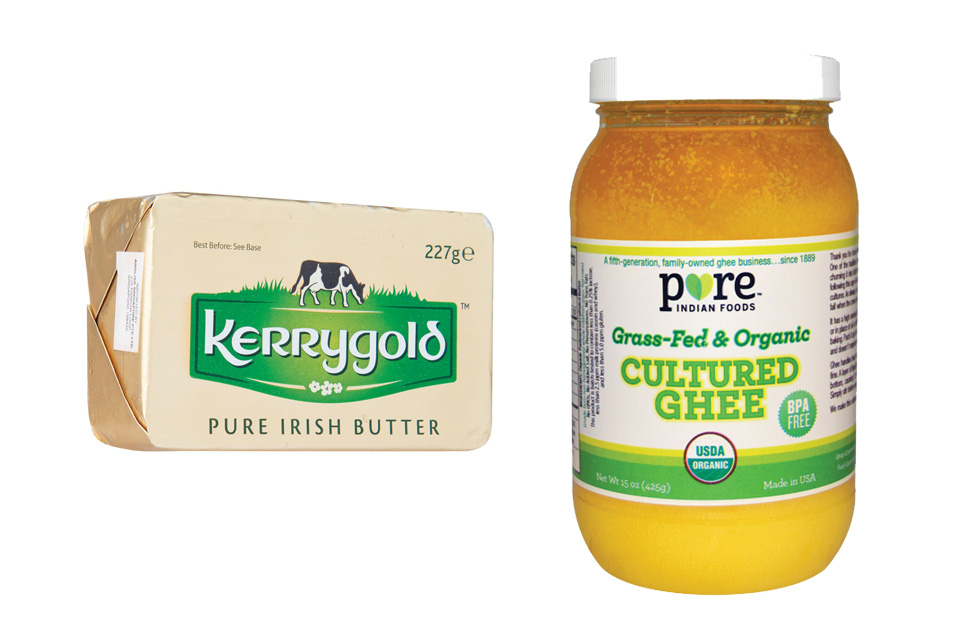Fit for Fat

It’s time to abandon the old saying, “You are what you eat,” especially when it comes to dietary fats. Now that years of research have proven certain fats are not only beneficial, but a necessary part of a well-balanced diet, athletes are ingesting it by the spoonful.
Butter and Ghee
Butter got a bad rap for a long time, but now that farmers are refining their practices and churning out butter from happy, grass-fed cows, it’s becoming a staple. More importantly, the myths that the saturated fat content would lead to heart disease and weight gain have since been debunked by doctors and researchers. Notable benefits include a solid dose of vitamins A, D, and K2–all of which improve digestive, cardiovascular, and adrenal health and bone density.
Saturated Fat: 51 percent
Kerrygold Butter
This brand is the crème de la crème of butter. It’s such a premium product, the salted butter is wrapped in gold (foil, that is).
Ghee, also known as clarified butter, is simply butter with the water and milk fat cooked out of it. The nutritional values are comparable to butter, but ghee stands out in a few areas. It’s a great choice for anyone with lactose intolerance or sensitivity, and has a higher smoke point for cooking. The consistency is different (butter is a bit creamier) but still touts the same anti-inflammatory properties.
Saturated Fat: 56 percent
Pure Indian Foods Ghee
The family behind this brand of ghee has been refining their product since the 1800s in northern India. This shelf stable cooking fat can last without refrigeration for up to three months.
Keep reading to learn about more healthy fats!
Animal Fats
Pork Lard, duck fat, and beef tallow are the most commonly used animal fats in the kitchen. What was once a product only available per request at a butcher shop is now finding its way onto grocery store shelves. Animal fats are flavorful and can be used to amplify the taste of even the simplest vegetable dishes. The amount of saturated fat serves as a source of energy, while also contributing to brain and nervous system development. Using animal fat is a natural option and especially fitting for anyone trying to minimize waste and use as much of the animal as possible, just like our ancestors once did.
Saturated Fat: Beef 46 percent, Pork 36 percent, Duck 33 percent
Epic Animal Fats
As part of their “Whole Animal Project” local company Epic produces a line of animal fats to further encourage conscious consumerism. At the most recent Natural Products Expo West, their duck fat won the the NEXTY award–bestowed to the most progressive, innovative, inspiring and trustworthy products in the natural products industry.
Keep reading to learn about more healthy fats!
Coconut Oil
Arguably the most versatile of the cooking fats, coconut oil is favored for many reasons. Although it can be used as a teeth whitener, makeup remover, deep conditioner, and skin cream, it’s applicable to plenty of baking and cooking needs. The taste is generally pretty subtle, taking to whatever food with which it’s cooking. Alternatively, coconut oil is delicious on its own (as long as you like coconut) and provides a boost of pre-workout energy for anyone who doesn’t want to eat too much prior to exercising.
Saturated Fat: 84 percent
Nutiva Coconut Oil
Coconut oil brands have taken over grocery store shelves. Cold-pressed, unrefined, liquid–there are so many factors to consider that mostly fall to personal preference. Nutiva is popular because of its value and commitment to keeping it as untouched as possible.
Keep reading to learn about more healthy fats!
Olive Oil
Believe it or not, cooking with olive oil has had a bit of controversy tied to it. Some argue that it’s best for dressings, while others argue it’s fine to use for high-heat frying. Finally, studies proved that olive oil could withstand the heat, but other options were better suited for any high heat methods. Olive oil is comparatively lower in saturated fat, which gives it a lower smoke point.
Saturated Fat: 13 percent
Whole Foods California 365
The controversy continues with the term “extra-virgin.” In the past couple of years, many brands claiming to be certified or up to standard have turned out to be illegitimate. However, the Whole Foods brand is tried and true.









